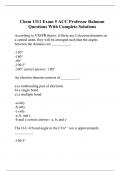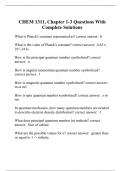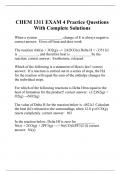chem 1311
Lamar State University
All 3 results
Sort by

-
Chem 1311 Exam 5 ACC Professor Rahman Questions With Complete Solutions
- Exam (elaborations) • 25 pages • 2023
-
Available in package deal
-
- $13.99
- + learn more
According to VSEPR theory, if there are 2 electron domains on a central atom, they will be arranged such that the angles between the domains are __________. -120° -180° -90° -109.5° -360° correct answer: 180° An electron domain consists of __________. a) a nonbonding pair of electrons b) a single bond c) a multiple bond -a only -b only -c only -a, b, and c -b and c correct answer: a, b, and c The O-C-O bond angle in the CO₃²⁻ ion is approximately ______...

-
CHEM 1311, Chapter 1-3 Questions With Complete Solutions
- Exam (elaborations) • 14 pages • 2023
-
Available in package deal
-
- $12.99
- + learn more
What is Planck's constant represented as? correct answer: h What is the value of Planck's constant? correct answer: 6.63 x 10^-34 Js How is the principal quantum number symbolized? correct answer: n How is angular momentum quantum number symbolized? correct answer: l How is magnetic quantum number symbolized? correct answer: m or mℓ How is spin quantum number symbolized? correct answer: s or ms In quantum mechanics, how many quantum numbers are needed to describe elec...

-
CHEM 1311 EXAM 4 Practice Questions With Complete Solutions
- Exam (elaborations) • 4 pages • 2023
-
Available in package deal
-
- $9.99
- + learn more
When a system _____________, change of E is always negative. correct answer: Gives off heat and does work The reaction 4Al(s) + 3O2(g) --> 2Al2O3(s) Delta H = -3351 kJ is ___________, and therefore heat is ___________ by the reaction. correct answer: Exothermic, released Which of the following is a statement of Hess's law? correct answer: If a reaction is carried out in a series of steps, the H∆ for the reaction will equal the sum of the enthalpy changes for the individual steps. ...

How did he do that? By selling his study resources on Stuvia. Try it yourself! Discover all about earning on Stuvia


